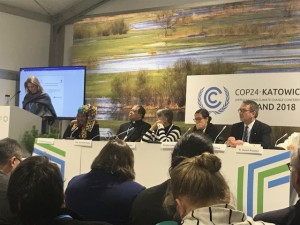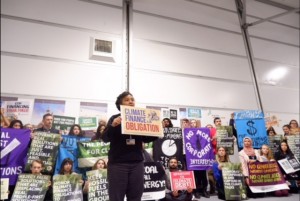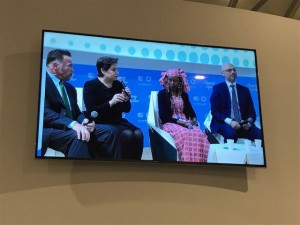Today I attended a showcase highlighting the work of the Climate Neutral Now award winners as part of the 2019 UN Global Climate Action Awards. It was a fun event and one that drove home for me the importance of engaging corporations (and communities, and cities, and all levels of sub-national governments) in the fight to stay below +1.5. Some of the really transformative work is being done by companies, and the four winners of this award really showcased some excellent initiatives. Four organizations won the award (video can be seen here: https://unfccc.int/climate-action/momentum-for-change/climate-neutral-now).
The representative from MAX Burgers went first who talked about their Climate Positive menu. He showed the analysis their company did on when their emissions was coming from (surprising no-one, a lot cam from beef) and how they tackled reaching 0 emissions. Their goal was to introduce more plant based food options and have every other meal not have beef (there were other things as well). He was asked about pushback to the menu and he responded by saying that there was some pushback, but also said that in general people have been very responsive and supportive. He felt that the marketing the change in a positive light (Climate Positive Menu) helped.
Apple went next, and I was skeptical. The organization has several environmental initiatives, but the representative specifically talked about their transition to 100% renewable energy at their sites. The speaker gave some interesting stats, including that Apple was responsible for 0.1% of all global emissions. The company set a goal to have all Apple owned operations powered with 100% renewable energy and generate a total of 4 GWt by 2020. They are investing in their own projects and doing it as locally as possible, which creates jobs in the areas where the facilities are. They met these goals early and have no switched to help their suppliers meet the goal of using 100% renewable energy for the production of the materials Apple uses. I found this really positive, because they not only made this demand but also helped these supplier make the energy transition. The combination of adding pressure and then providing resources and support is powerful, and corporations with the influence and money like Apple should be doing this work. They added another 1 GWt of energy production through this. I felt strangely proud to have all three of my Apple devices with me during this talk…
Natura, the 4th largest cosmetic company in the world, went next. They talked about packaging and materials. The thing I took away most here was how they have partnered with the Indigenous Peoples of the Amazon to use local ingredients for their cosmetics, which supports the livelihoods of the people and provides a local and sustainable supply chain.
The final presentation was from Infosys, a global tech services and consulting company headquartered in India. There path to zero emission used a combination of energy efficiency (highly efficient new buildings and deep retrofitting of old buildings), transition to renewable, and off-setting. I rolled my eyes a bit on off-setting, but the presenter impressed me because all of their offsets have been done at the local level. They invented off-sets that engaged and supported the local community and improved the general quality of life for the people living there. This is the kind of off-setting that I can get behind!
In total, I found this event very inspiring! There is some much positive and transformative work going on, and it is good to be reminded especially when it feels like the policy makers are not acting fast enough.


